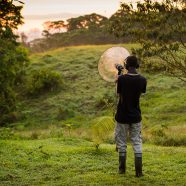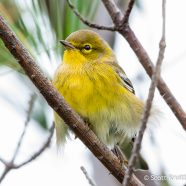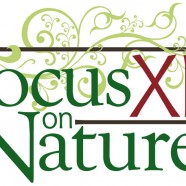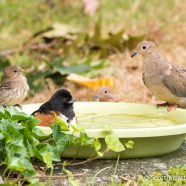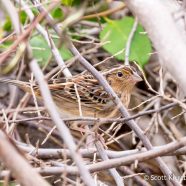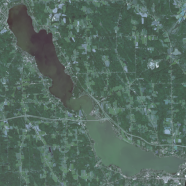Biology Without Borders
Roger Tory Peterson traveled the world to explore, discover, and document its flora and fauna. He applied his artistic talents to describe and illustrate plants and animals in far-away regions to make their existence known to a broad audience, while his biological observations and knowledge supported conservation efforts and helped elicit positive environmental change. Probably the most obvious examples of this lesser-known side of Peterson’s legacy are his spectacular ‘Field Guides to Mexican Birds’ and ‘Birds of Britain and Europe,’ although behind the scenes his experience influenced...
Read MorePine Warbler
Here is a Pine Warbler (Setophaga pinus) that I enjoying finding last weekend during less than optimal migratory conditions on one of those autumn days that feels like the definition of the seasonal transition. And would you look at that, what is it foraging in? Why a White Pine tree, naturally. They are also one of the first warblers to return in the spring when March is finally beginning to break winter’s hold on the Northeast. Pines are a bright little beacon of spring’s light coming in or summer’s glow heading out. We only have a few more weeks to enjoy a variety of...
Read MoreFuture 2016-2017 Exhibits
Please visit us at the Roger Tory Peterson Institute of Natural History soon to enjoy our current exhibition, Rainforest Adventures by Jan Lutz on display from September 9 – November 13, 2016, and keep an eye on what is coming in the future! Focus on Nature XIV December 3, 2016 – April 9, 2017 Since its inception in 1990, the exhibit series Focus on Nature has reflected the standards, materials, and skills of contemporary natural history illustrators. It promotes awareness of a genre of art that requires scientifically accurate illustrations such as research journals and publications,...
Read MoreBird Baths
Here is a great example of how you do not need to break your budget while attracting birds to your yard. Putting out bird seed, suet and so forth and making a home feeding station brings in all sorts of feather friends, as can erecting nest boxes for specific species, creating a brush pile, allowing grass and flowers to grow for natural seeds and nectar, or giving them nest building materials like fur. However, even some just regularly provided clean water can do the trick, especially in times of extreme heat, drought, or frigid cold (if heated!). Here is little more than a plastic tray with...
Read MoreGrassland Migrants
Yesterday I was able to enjoy and photograph a couple of uncommon grassland birds for us in the Northeast – the Dickcissel (Spiza americana) and the Grasshopper Sparrow (Ammodramus savannarum). Both of these species had been spotted at Stratford Point where they are almost annual visitors, with Dickcissels typically stopping over in the fall and Grasshopper Sparrows being seen sometimes in both spring and autumn. I decided to take a walk around the site with my friend and great birder Tom Murray as we were giving the sparrows some space in hopes the unseen Grasshopper would pop back...
Read MoreBird’s Eye View of Algal Bloom in Chautauqua Lake (New York)
Lack of rainfall during the summer months can allow nutrients to accumulate on the landscape. When intense rains finally arrive, these nutrients are flushed into waterways often resulting in algal blooms. This process is exemplified by this landsat satellite image of Chautauqua Lake (taken Sunday, 9/28 from 438 miles up) courtesy of RTPI’s GIS Lab.
Read More



